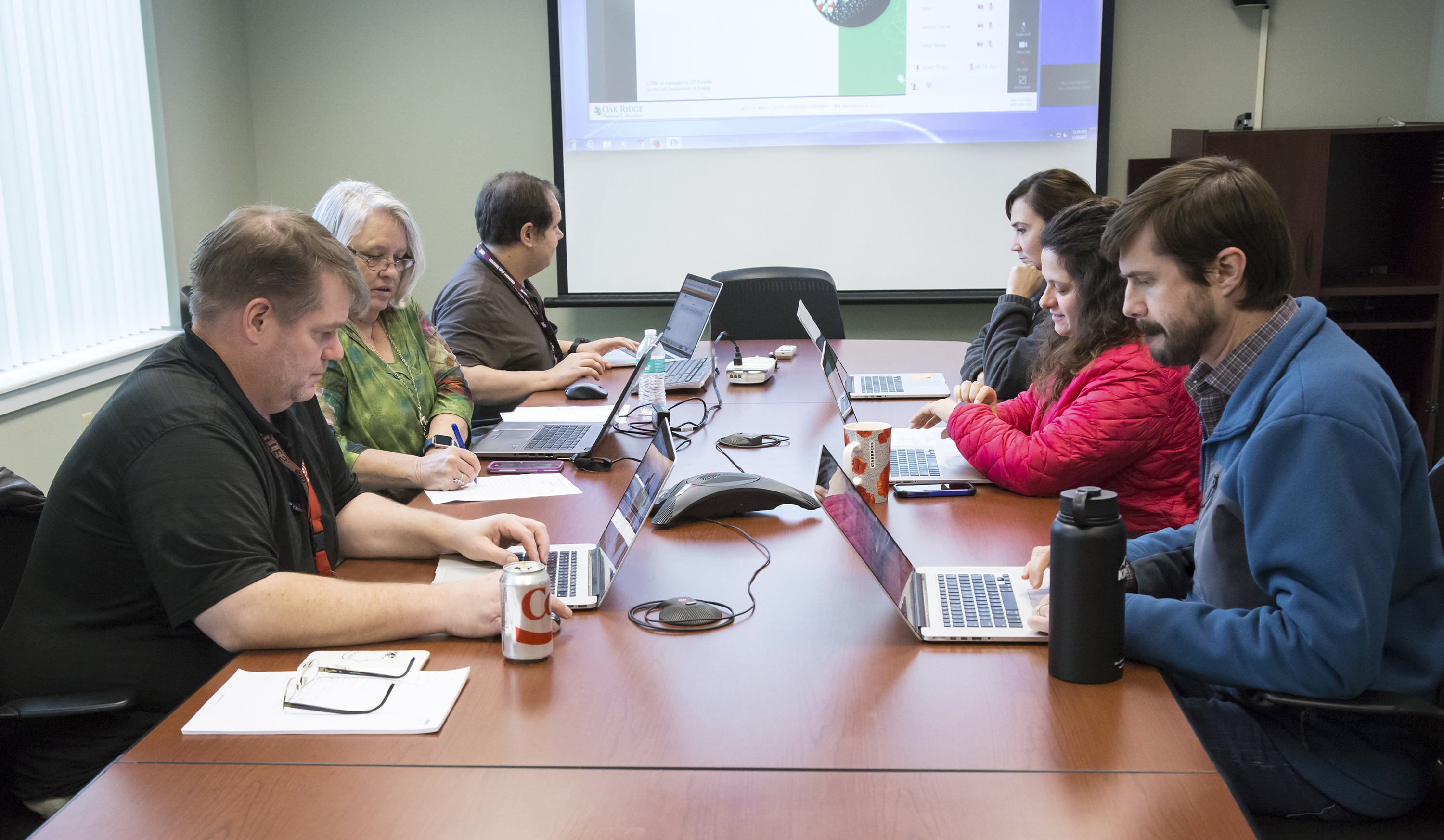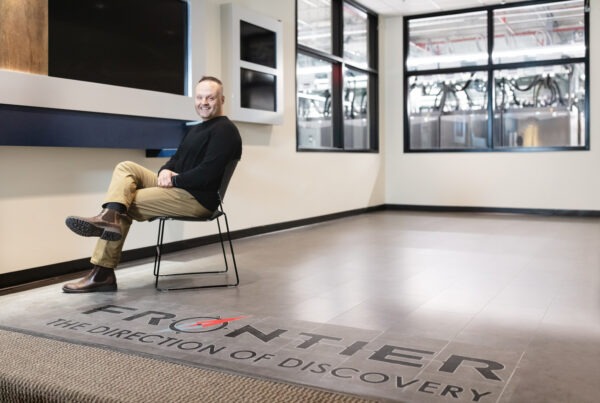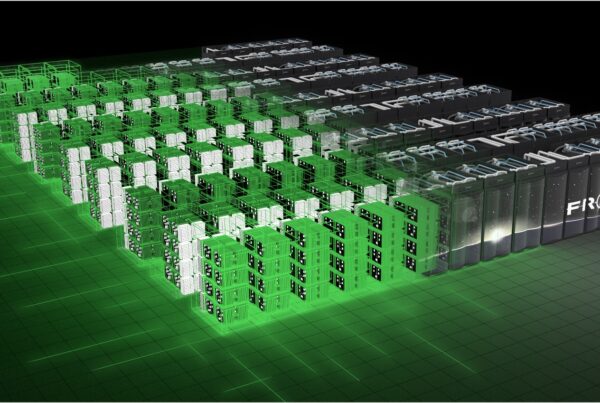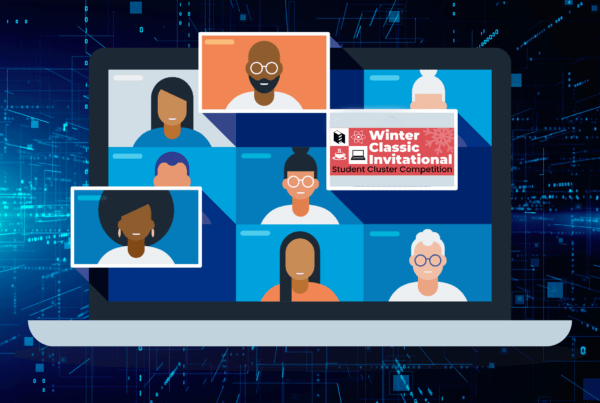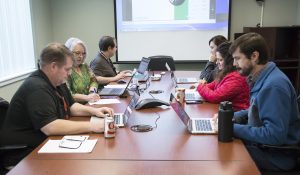
OLCF staff members led an Introduction to VisIt conference call, which taught users about the open source visualization and animation tool VisIt. Pictured here are (left, front to back) Dave Pugmire, Sherry Ray, and Bill Renaud with (right, front to back) Chris Fuson, Suzanne Parete-Koon, and Ashley Barker.
Need support? Every month the Oak Ridge Leadership Computing Facility (OLCF), a US Department of Energy (DOE) Office of Science User Facility located at DOE’s Oak Ridge National Laboratory, hosts webinar-based conference calls for users of OLCF systems, including the OLCF’s flagship supercomputer, Titan.
The calls, which began as quick 5-minute tips, have grown to cover comprehensive topics, including best practices, new tools, and how-to guides. Participants include users who have been awarded grants under the OLCF’s three allocation programs—the Innovative and Novel Computational Impact on Theory and Experiment, ASCR Leadership Computing Challenge, and Director’s Discretionary programs.
The webinars come in two basic types: instructional, or “knowledge-based” talks, during which OLCF staff members give presentations or tutorials that explain tools or policies, and user experience talks that allow users to share their experiences with the facility’s systems. Last year more than 385 people attended the 11 user conference calls, which typically occur on the third or fourth Wednesday of every month. Staff members have recommended that groups with large projects send one person to the call each month to stay updated about new tools and policies.
Suzanne Parete-Koon, user support specialist at the OLCF, said the user experience talks provide a platform for a unique type of discourse between staff members and users.
“Our executive user board has a strong interest in supporting user-driven content,” Parete-Koon said. “For this kind of content, we enable users to share high-performance computing [HPC] knowledge with each other. This could include discussions of which algorithms, tools, or methods worked best for them on OLCF systems, or presentations about how they overcame a particular HPC challenge to achieve their scientific goals using our resources.”
Last year Mike Zingale, associate professor in the Department of Physics and Astronomy at Stony Brook University, presented a user experience talk called “Intro to yt visualization on Titan/Rhea,” which introduced users to yt visualization, a component of the open-source Python package yt. Rhea is a cluster at the OLCF used for data analysis of Titan simulations. Other user experience talks covered strategies for assessing portability of industrial codes to GPU hardware and using PyFR, a Python-based solver, on Titan. Python is a highly readable, general-purpose programming language.
The OLCF also conducted a number of knowledge-based talks in 2016. “How to OLCF,” a session led multiple times by Parete-Koon and HPC User Support Specialist Bill Renaud, covers the basics of running jobs, getting access to the system, and best practices. Other knowledge-based talks covered topics like managing Python, using the open source Globus toolkit for grid computing, and visualizing data with the open source visualization and animation tool VisIt.
“These calls benefit users because they can give us feedback or ask questions,” Parete-Koon said. “Users are learning from OLCF staff and each other about techniques and tools the OLCF is providing. In addition, when our help desk gets questions about a tool or resource that we have covered in the webinars, the answers can include a link to a video recording of the appropriate talk to provide a supporting example or tutorial.”
Alexandre Sorokine, research and development staff member for Scalable and High Performance Geocomputation in the Geographic Information Science and Technology Group, regularly attends the user conference calls and believes they are an important opportunity for users to learn more about the OLCF systems.
“In addition to working on their research, OLCF users must learn a lot about the technical aspects of the systems,” Sorokine said. “These calls not only inform users about specific details of HPC operations like parallel file systems, but they also help users discover new things they may not have known existed—such as HPC debuggers and other software programs.”
Upcoming User Conference Calls and Events
OLCF User Conference Call—April 26, 2017
OLCF 2017 User Meeting—May 23–25, 2017
Links
OLCF training channel: https://vimeo.com/channels/olcftraining
OLCF training events page: https://www.olcf.ornl.gov/support/training-events/
OLCF help desk: [email protected]
Oak Ridge National Laboratory is supported by the US Department of Energy’s Office of Science. The single largest supporter of basic research in the physical sciences in the United States, the Office of Science is working to address some of the most pressing challenges of our time. For more information, please visit science.energy.gov.


